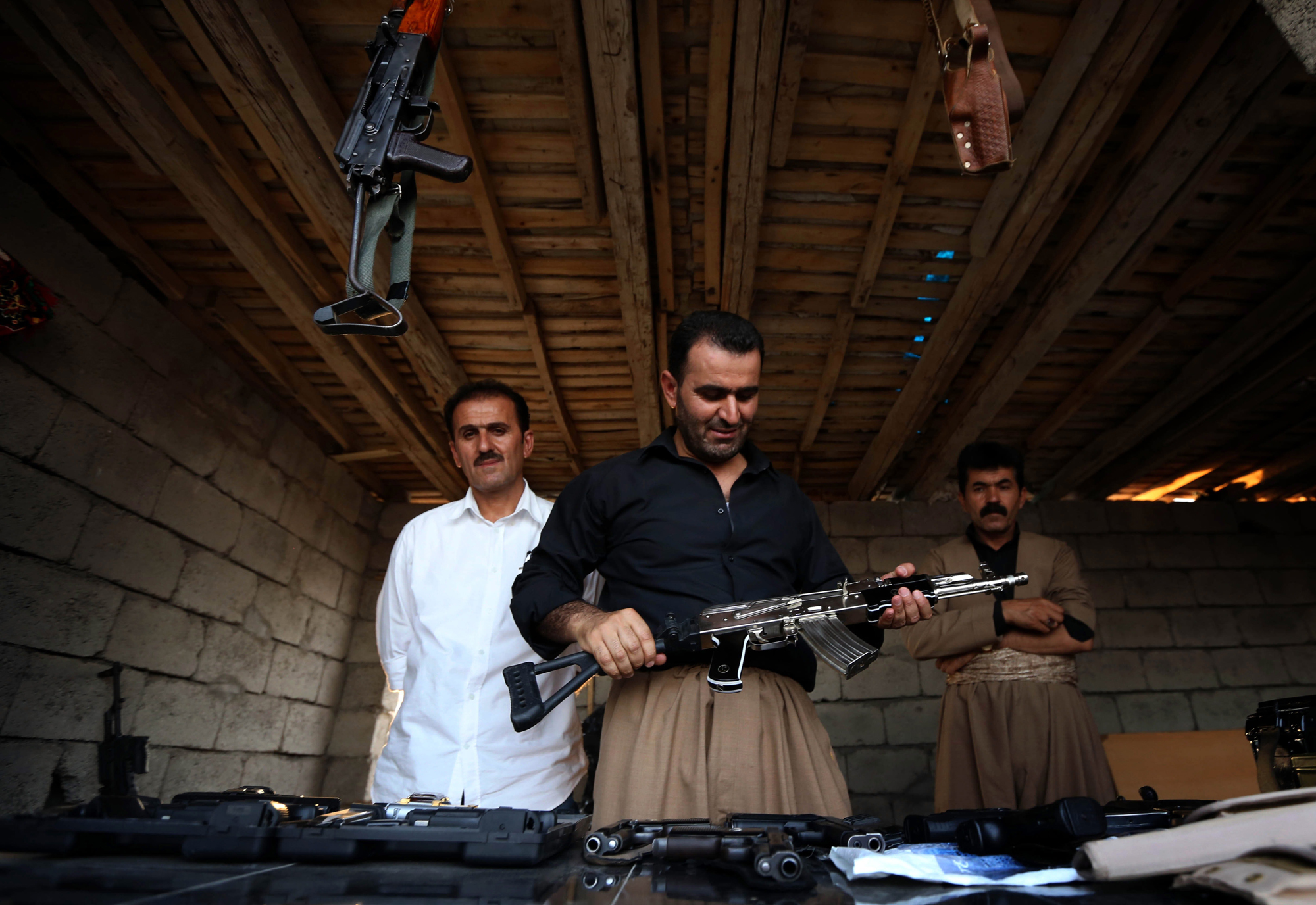
Next to a criminal prison in Erbil, Kurdish traders hawk Kalashnikovs, pistols and even American made M16s.
“This is $1,500,” says Saleh Mahmoud, stroking the wooden shaft of a Bulgarian-made Kalashnikov. “Last week this gun was $2,000. The day the terrorists came near Erbil everyone was buying weapons.”
Mahmoud has dealt in arms since 1991, when the Kurds were battling Saddam Hussein’s Iraqi army. In more than two decades in the arms trade, he says he’s never seen prices skyrocket like they did 10 days ago as Islamist militants showed up on the Kurds’ doorstep. And while Kurdish fighters, known as the peshmerga, retook the critical Mosul Dam from the militant group Islamic State of Iraq and Greater Syria (ISIS) on Monday, the fighting against the extremists is far from over. The peshmerga were only able to retake the dam with assistance from the Iraqi national army and heavy American air cover. The fact that it took three armed forces to recapture just one structure from ISIS shows the strength of the militants—and doesn’t bode well for Iraqi and Kurdish forces. The semi-autonomous Kurds are considered to have the most capable army in Iraq, but they have mostly light artillery, and no air force.
Outside the headquarters of Asayesh, the peshmerga’s intelligence arm, three large Kurdish men stand on guard with Russian made weapons—a couple of aging Kalashnikovs and a newer Izhmash. A lot of the weapons carried by peshmerga forces were looted from Saddam’s army bases in 1990s, and they weren’t top shelf even then.
President Barack Obama said Monday that the United States had “urgently provided additional arms and assistance to Iraqi forces, including Kurdish and Iraqi security forces who are fighting on the front lines.” But Colonel Hersh Muhsin, who heads the Asayesh munitions unit in Erbil, says he hasn’t seen any new guns.
“Come with me,” he says, opening a closest with a few RPGs and rifles leaning against the wall and mounted PKC machine gun sitting on the floor. “These RPGs are useless against America-made armored vehicles. On the front lines, ISIS all have American made weapons, and we do not.”
But while they may be poorly armed, Muhsin says the peshmerga are strong because they are fighting to protect their land. “Less important is the gun, and more important is the strength of the ideology of the hand that holds it,” he says.
The peshmerga are known for being passionate fighters, raised on guns and nationalism in the mountains of Kurdistan, but Muhsin may be underestimating the conviction of the ISIS fighters who pledge their allegiance to the group’s leader, Abu Bakr al-Baghdadi, and fight for the dream of an Islamic caliphate.
The lack of budget and supplies has pushed Kurdish fighters to buy their own guns. That, combined with the fear of the general population, pushed up weapons prices early in the month.
“But now people are looking to the media which says everyday that France, Germany and America will send weapons,” Muhsin says.
Back at the market, the buyers and sellers say that prices have finally dipped, a sign people here have faith the weapons are coming from aboard. The market is filled with peshmerga fighters buying their own guns, but everyone here calls for the international community to give more.
“I bought this to fight ISIS,” says Niro Talat, a 34-year-old driver who managed to find $3,000 to buy a brand-new M-16. He twists the sleek black weapon in his hands. “This is better than a Kalashnikov. It’s more accurate. It’s a good weapon.”
No one here seems to know how a new M-16, stamped, “Property of the U.S. GOVT,” ended-up in this market, but it raises questions about the fate of foreign arms provided to the Kurds to fight ISIS.
The position of this gun market, a few hundred meters from a criminal prison, may be an indication of the Kurdish forethought when comes to weapons. “Do you want to take a picture of an RPG,” asks a man leaning into the car wearing military fatigues and the very-popular-here faux ‘US Army’ shirt. “Come, it’s in my house.”
The peshmerga were born of Kurdish resistance and trained as guerilla fighters to protect their mountainous territory and fight for independence. The Kurdish leaders are preaching about ISIS’s brutality and the militants’ superior American arms, demanding equally good weapons to fight the extremists.
But where will those guns be pointed when—or if—ISIS is defeated? The goal of theses Kurdish fighters has always been an independent Kurdistan.
More Must-Reads from TIME
- Donald Trump Is TIME's 2024 Person of the Year
- TIME’s Top 10 Photos of 2024
- Why Gen Z Is Drinking Less
- The Best Movies About Cooking
- Why Is Anxiety Worse at Night?
- A Head-to-Toe Guide to Treating Dry Skin
- Why Street Cats Are Taking Over Urban Neighborhoods
- Column: Jimmy Carter’s Global Legacy Was Moral Clarity
Contact us at letters@time.com